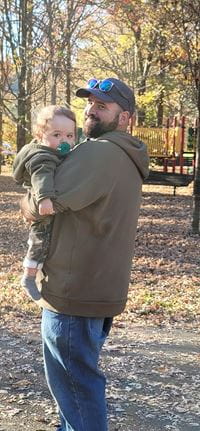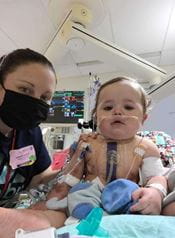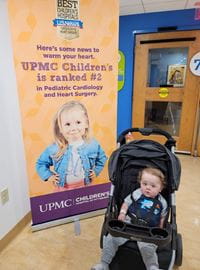On Aug. 5, 2020, expecting parents Tressa and Chase attended an ultrasound appointment for their future son, Matthias. For more than two hours, their sonographer focused on examining the baby’s heart and took more than 238 pictures. At that point, Tressa and Chase received the diagnosis that their baby had Ebstein’s anomaly.
 Ebstein’s anomaly is a rare, congenital heart defect characterized by an abnormality in the tricuspid valve. The defect causes this valve, which separates the right ventricle from the right atrium, to leak blood into the right atrium from the wrong direction.
Ebstein’s anomaly is a rare, congenital heart defect characterized by an abnormality in the tricuspid valve. The defect causes this valve, which separates the right ventricle from the right atrium, to leak blood into the right atrium from the wrong direction.
Tressa and Chase’s initial thoughts were filled with uncertainty and questions about their baby’s future. They were concerned about their length of stay in the hospital and where to seek the best care for Matthias. Their doctors provided as much information as possible and referred them to specialists in their home state of Florida.
After attending additional screenings and appointments for Matthias, Tressa and Chase began to feel uneasy about the care they were receiving. Their specialist recommended older surgical techniques for Ebstein’s anomaly and had hesitation moving forward with Matthias’ condition. Tressa and Chase made the decision to prioritize their son’s care and seek out the leading experts for his condition.
“At that point, we were members of an Ebstein’s anomaly group on Facebook and had been hearing the names of the top surgeons in the country,” explained Chase. “We started asking for Matthias’ hospital records and drove around ourselves to pick them up. We mailed them to UPMC Children’s Hospital of Pittsburgh.”
 José Pedro da Silva, MD, founding director of the Da Silva Center for Ebstein's Anomaly Center at UPMC Children’s Hospital of Pittsburgh, quickly reached out to the family. He called them to discuss Matthias’ condition and the cone repair surgical procedure, a technique that was invented by Dr. da Silva in 1993 and has since become the worldwide standard of care for patients with Ebstein’s anomaly.
José Pedro da Silva, MD, founding director of the Da Silva Center for Ebstein's Anomaly Center at UPMC Children’s Hospital of Pittsburgh, quickly reached out to the family. He called them to discuss Matthias’ condition and the cone repair surgical procedure, a technique that was invented by Dr. da Silva in 1993 and has since become the worldwide standard of care for patients with Ebstein’s anomaly.
“On Oct. 5, Dr. da Silva spent well over an hour talking to my wife, Tressa, about Matthias’ condition, the surgical procedure, and the possible alternatives moving forward,” said Chase. “The biggest takeaway was that Dr. da Silva told us he felt confident in performing the cone procedure on Matthias. Dr. da Silva invited us to Pittsburgh and said that he would take our case, and we were filled with relief.”

Tressa and Chase immediately arranged for their five children and four dogs to be cared for while they traveled to Pittsburgh to deliver their baby.
When Chase and Tressa arrived, they were welcomed by the teams at UPMC Children’s and UPMC Magee-Womens Hospital. A doctor met with Tressa and Chase to discuss their care journey in Pittsburgh while they stayed at the Ronald McDonald House.
Several days later, Tressa was admitted to UPMC Magee and gave birth to Matthias on Oct. 17.
“It was shocking how many people were in the room and waiting in the hallway with us that day,” said Chase. “Between the surgical team, the ob-gyn team, the NICU team, and the transport team, Dr. Johnson arranged for an amazing group of people dedicated to caring for us.”
Soon after he was born, Matthias was transported to UPMC Children’s to receive his next stage of care.
In the next few months, Matthias was closely monitored in the CICU by the team at UPMC Children’s. He received his first surgery from Bryan Goldstein, MD, who performed a cardiac catheterization procedure to improve Matthias’ heart condition until his cone procedure.
On Feb. 8, 2021, Matthias went into surgery for his cone repair. After about six hours of preparation and surgery with Dr. da Silva and his team, Matthias’ parents were able to see their son.
“We felt confident in the da Silvas’ ability to take care of our son,” said Tressa.
To honor the da Silvas and the team at UPMC, Tressa and Chase decided to name their son Matthias Jose, after Dr. Jose Pedro da Silva. They wanted to acknowledge Dr. da Silva’s willingness to accept their case and his dedication to Matthias’ treatment.
Tressa and Chase encourage parents and families who share this journey to study, research, and learn as much as possible to become the best advocate for their child. They urge parents to find healthy outlets and resources to cope with the many emotions that this process brings.
Now, Tressa, Chase, and their six children live in Pennsylvania to remain close to their care team at UPMC.
“We want to make sure that Matthias remains in the best hands possible, and we believe that the team at UPMC Children’s is who can do that for us,” said Tressa.
Contact the Da Silva Center via email at dasilvacenter@chp.edu or call 412-692-5218.
Matthias’ treatment and results may not be representative of similar cases.









